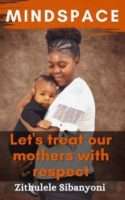A recent episode of Khumbul’ekhaya had me rethinking my stance on issues of identity and familial bloodlines.
The show featured a young man I will call Themba because his name has escaped me. What struck me about Themba’s story was how, when he was narrating it, he kept on referring to the family he wanted to be accepted into as his ‘real’ family. You would be forgiven for thinking Themba had been adopted by total strangers unrelated to him. But he hadn’t been adopted. He had been raised by his mother’s family.
Like most people who come into the show, Themba was searching for his father. I take interest in such stories because at one stage of my life, I was thinking of initiating a search for my father. Unlike Themba and the hundreds before him though, I didn’t have the guts to take my search to national TV. There is something unsettling about the people who come out in their numbers to see Khumbul’ekhaya live as it happens right in front of them. These people are always in the camera person’s shot. For this reason, I continue searching for my father vicariously through stories of the Thembas of this world.
Themba said he had consulted a traditional practitioner and they advised him to find his father because he needed to connect with his ‘real’ family. He needed to find his father, his plug point to this ‘real’ family’s surname and bloodline. This struck me in a way that it hadn’t before.
Themba had known one family his whole life. He expressed a distrust of that family’s surname because he said he had learned that it wasn’t exactly his late mom’s genuine surname to begin with. It was the surname of his grandmother, his mother’s mother. But up until the day he would meet his father, one half of his two-piece identity puzzle, the family he had always known as his family, was the only family he knew. Surely they were truly his family too.
Inspired by Themba’s story, I did some reading on bloodlines and how they are seen in my culture.
IsiZulu cultural norms and traditions state – and this is according to iAfrika.org, a web-based body advising on IsiZulu culture – that a child belongs to their mother’s family until they are transferred to another family through a traditional ceremony. Only children born of married parents, iAfrika points out, and those for whom the change of surname was done through a ceremony with families of both the mother and father present, can use the father’s surname.
The above tells me that according to the African culture, a father earns the right to have the children he’s fathered use his family name. It tells me that whatever feelings Themba harboured against the family name he had grown up using, he still needed that family to approve the transfer to what he called his ‘real’ family, his paternal family.
Themba also mentioned having gone through hardships in his life. He said he was unemployed, couldn’t keep a job and when drunk, he would be attacked by random strangers. He said that his advisor attributed his misfortunes to using an incorrect surname. I could believe Themba had received that information. People before him reported having received such advice. When I had consulted about exactly the same reason, I was given the same advice.
His reasons – bar getting beaten up by random strangers – were exactly the things I also cited as wrongs I wanted my father to help put right. Themba was me a few years back. I also believed that my father’s family name was the ultimate. It was a surname I desperately needed to be inducted into to gain ancestral protection and luck.
Imagine that. Imagine wanting to push your way into a bus that is lighter and can move faster without you in it. That’s how I now feel about wanting to convert over to an absent father’s family name. Because you don’t just get rejected by him. You get rejected by family members who know of your existence but don’t fight for you to take your rightful place in the family.
We get made to believe that our ‘real’ ancestors will bore a little hole in our pockets, they will make our hands slippery, unable to hold onto stable jobs and as in Themba’s case, they will unleash violent strangers on us — all to make us see the problem of keeping the surnames we were born into. Surnames we didn’t even know we had when they were gifted to us.
But who should be punished here? Who abandoned whom?
I am not stopping anyone from going in search of their absent fathers. This could be helpful. They can get to hear their father’s side if the story and hopefully get closure. Being rejected can lead to self-loathing and can have a terrible effect on one’s self esteem.
But I do think we need to treat our mothers and their families with a little more respect and courtesy. Considering their feelings in the matter of searching for our fathers is the least we can do. The grass always looks greener in the other side, yes. But a little watering and tending to can make the lawn in your yard sparkle.
***
Read about one writer’s experience with absent fathers here
Tell us: Do you agree that we need to show our mothers more respect?



